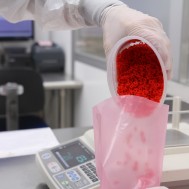Viton® is a specific brand of Fluorocarbon (FKM) and is a registered trademark of The Chemours Company. This synthetic rubber polymer is commonly used in o-ring applications for aircraft engines, automotive fuel handling systems and other applications requiring high temperatures and low compression set.
One of the first steps in designing a rubber seal is choosing the right material for your application. This is a critical stage in development, as every rubber compound carries its own strengths, weaknesses and sealing capabilities. Before choosing Viton® as your trusted material, here’s everything you need to know about it.
Key Strengths
Viton® has outstanding resistance to heat. In fact, one Viton® o-ring can withstand temperature ranges from -13°F to 446°F. Since some rubber compounds are known to fail in extreme high-temperature environments, Viton® is a great candidate for applications working under these circumstances.
Viton® also is known for its excellent chemical resistance, making it a universal o-ring material. When rubber is introduced to chemicals, it can absorb the fluid like a sponge, causing it to swell. This can be damaging to a seal, since excessive swell can cause premature failure. Chemical compatibility is extremely important during the material selection process to ensure your material will not react when introduced to specific chemicals.
With exceptional chemical resistance, Viton® offers swell resistance in high octane and oxygenated fuel blends. This gives Viton® superior performance abilities in Ethanol/Methanol blended gasoline applications. It’s important to note, however, that standard grades of Viton® do not offer the same resistance to steam and ethanol fuels and should not be used in these applications. Base resistant grades also offer improved resistance to amine based oil protectants found in new transmission oils.
Important Limitations
While Viton® is resistant to a long list of chemicals, it is not recommended for exposure to:
- Ketones
- Amines
- Low molecular weight esters and ethers
- Nitro hydrocarbons
- Hot hydrofluoric or chlorosulfonic acids
- Skydrol® fluids
In contrast with its high-temperature resistance, Viton® does not retain flexibility at low temperatures, so it is not recommended for low-temperature applications.
Ideal Applications
With intense versatility and resistance properties, Viton® is typically the right material choice for more heavy-duty applications. Commonly employed in various gasket, o-ring and other rubber sealing solutions, Viton® has become a reliable material for automotive seals, transportation fuel applications and aerospace seals, pumps and valves.
Want to learn more about Viton®?
Tweet us @AppleRubber to continue the conversation.
